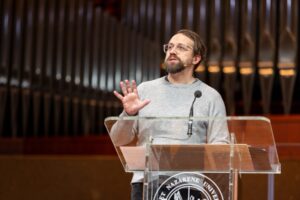This article ran this week on the WCA website. I’m reposting it here in its entirety for those who may not travel in UMC circles with the prayer that the Holy Spirit might spark a theological revival rooted in the supernatural in our day.
Thomas Jefferson once took a penknife and cut most of the miracle stories out of the Bible, leaving only the teachings of Jesus. He included the tomb but cut out the resurrection. What was left, mostly the teachings of Jesus, Jefferson entitled, “The Philosophy of Jesus of Nazareth.”
What Jefferson did to the Bible with a penknife, many contemporary Christians unwittingly do with their lives. Especially in the U.S., much of Christian culture has managed to surgically remove the supernatural from the experience of Jesus of Nazareth. We’ve fallen out of the habit of talking publicly and passionately about how to transform lives. We will talk about decline in church attendance, the cultural shift away from Christendom and the declining morals of our society, but we have neither the vocabulary nor the comfort for talking about the spiritual realm. And yet, according to Jesus himself, the work of God’s people is to expose the Kingdom through the supernatural work of casting out demons, curing disease, healing sickness and seeing people transformed by truth.
In fact, this is the prescription offered by Jesus himself when he sent his followers out on their first evangelistic mission. We find the charge in the first verses of Luke 9: “One day Jesus called together his twelve disciples and gave them power and authority to cast out all demons and to heal all diseases. Then he sent them out to tell everyone about the Kingdom of God and to heal the sick” (Luke 9:1-2, NIV).
I am fascinated by the contrast between what I read in these verses and what I see in the current western culture. What he sends these followers to do carries the power of real transformation. This supernatural sending exposes the Kingdom of God in a way much contemporary ministry does not. In this season of change in our denomination’s life, how can we recover this charge? What does it look like for Wesleyans? I suspect it begins with a commitment to a Kingdom-down worldview.
In an earlier Outlook article, Walter Fenton referenced a post by Dr. Wes Allen, Professor of Homiletics at Perkins School of Theology. In his diagnosis of our current UM conflict, Dr. Allen offers an insight about the starting points of those on either end of the theological spectrum. “Traditionalists emphasize the vertical relationship characterized in the command to love God with our whole heart, soul, strength, and mind. In traditional evangelical vocabulary, this is often expressed in terms of the importance placed on individuals having a personal relationship with Jesus Christ… Progressives (and to a great extent, moderates)… start with the horizontal relationship. In this view, the command to love our neighbor as ourselves is seen as the primary (perhaps even synonymous) expression of loving God with our whole being…”
“There is much overlap,” Allen says, “between these two positions (obviously conservatives care about social ethics and progressives care about individual morality). But with the different emphases, the depth and width of the chasm between these vertical and horizontal starting points has become so significant that at times the different UM camps seem to be practicing two different religions or Christianities…”
I agree with this diagnosis. The root of our current impasse is in what leads. Is Christianity primarily a belief system emphasizing social justice, or is it primarily an encounter with the One, True God that emphasizes — even insists on — ongoing supernatural transformation? I am convinced that authentic Christianity is a Kingdom-down proposition. If we want to see the Kingdom come, it will happen as we openly, boldly acknowledge that Jesus was and is not just a great cultural stabilizer but also a supernatural God whose resurrection leads those who follow him directly into the supernatural realm. Our call is to receive the power and authority offered us by Christ himself — and on the resurrection side of this story, that includes the Holy Spirit — and then to go out as he sends to drive out death and expose the Kingdom of God.
This is our call. Friends, we are not sent out with an eyedropper full of Holy Spirit so we can run a friendly non-profit. If we are going to give the world a better definition of “church,” then we need the infilling and empowerment of the Holy Spirit so we can live out a bold charge to cast out demons, cure disease, proclaim the Kingdom and heal the sick. I believe the Lord longs to see his Church acting as if he is a supernatural God and ours is supernatural power. I’m advocating for a renewed Methodism that is a partnership with a supernatural God who does supernatural things. Surely Jesus means for Methodists to have the Holy Spirit, too!
After all, miracles are the cornerstone of the Christian faith. Without miracles, we lose the divinity of Jesus. Without the virgin birth, Jesus is just another kid born to an unwed mother. He begins to look more like Buddha or Mohammed and less like a God in the flesh. Without miracles, we lose hope. If Jesus didn’t supernaturally conquer death, we have no assurance of an afterlife nor any reason to assume that the cross has power to cancel sin.
Without miracles, we lose touch with the essential character of God. Through the epic miracles of Scripture (the parting of the Red Sea, the miraculous catch of fish, the woman whose oil lasted through a famine, the drowning of a legion of demons), we are drawn into the realm of God’s Kingdom and influence. Miracles are a foretaste of coming attractions, when every tribe and tongue is standing before the throne, crying out, “Salvation belongs to our God!”
This, I believe, is exactly what Jesus means to do when he sends his followers out with power and authority to cast out demons, cure disease, proclaim the Kingdom and heal the sick. He is calling them to look for signs of the anti-Kingdom, directing them, “Wherever you see them — demons, disease, sickness — take the authority invested in you to cast out darkness and proclaim the victory of the Kingdom of God.”
With all due respect to President Jefferson, this is what it means to be a Christian, and I hope this is what it looks like when Wesleyans embrace supernatural ministry. It is to declare the one, true God and his supernatural revelation through Jesus Christ, as we are sent out with power and authority to fulfill this bold charge: Cast out demons, cure disease, proclaim the Kingdom and heal the sick.








